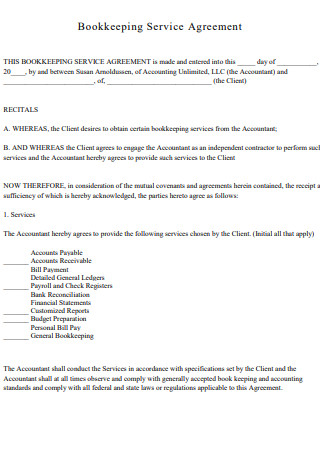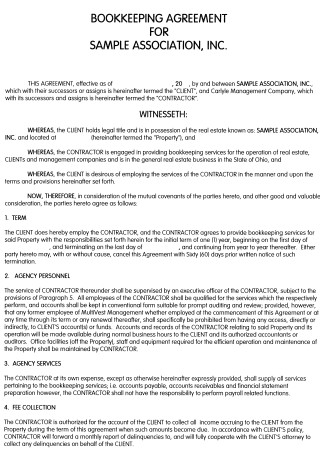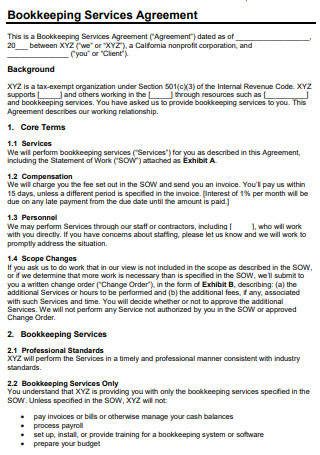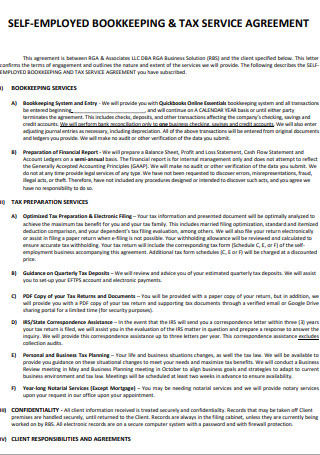3+ SAMPLE Bookkeeping Agreement
FREE Bookkeeping Agreement s to Download
3+ SAMPLE Bookkeeping Agreement
What Is Bookkeeping Agreement?
What Is the Importance of Bookkeeping?
What Is a Bookkeeper?
What Does a Bookkeeper Do?
How Much Do Bookkeepers Make?
Elements of a Bookkeeping Agreement
How to Write a Bookkeeping Agreement
FAQs
What Does it Mean to Do Bookkeeping for a Company?
Is the Advice to Accountants About Bookkeeping Correct?
What Is an Example of a Bookkeeping Objective?
Furthermore, Bookkeeping services agreements are entered into between a client and a bookkeeper to offer accounting services on either a one-time or monthly basis, depending on the circumstances. The bookkeeper will most certainly have access to financial records such as bank statements, receipts, revenue figures, and other financial data. Consequently, it is critical that the bookkeeper chosen is someone who can be relied on to do an excellent job.
What Is Bookkeeping Agreement?
Bookkeeping is the process of recording the financial transactions of a company on a regular basis and keeping track of them. Companies that maintain effective bookkeeping are able to track all of the information on their books and use that information to make an important operational investment, and finance choices. Bookkeepers are individuals who are responsible for the management of all financial data for a company. The absence of bookkeepers would mean that businesses would be unaware of their current financial situation, as well as the transactions that take place within the organization. Achieving accurate bookkeeping is also important for external users, such as investors, financial institutions, and the government – individuals or organizations who require trustworthy information in order to make a more informed investment or lending decisions. Simply put, businesses rely on accurate and trustworthy bookkeeping for both internal and external users in order to function properly.
What Is the Importance of Bookkeeping?
Proper bookkeeping provides businesses with a solid indicator of their overall performance. It also gives information to help with broad strategic decisions and serves as a benchmark for the company’s sales and profit targets. In short, after a business is up and going, it is necessary to devote additional time and resources to maintaining accurate financial records. Because of the high cost of hiring full-time accountants, many small businesses do not really employ accountants to work for them. Most small businesses, on the other hand, hire a bookkeeper or outsource the task to a professional agency. Important to note is that many people who are planning to start a new business often ignore the importance of details such as keeping meticulous records of every penny spent on advertising and other promotional activities. There are some templates that are associated with bookkeeping agreements such as accounting ledger book, cash bookkeeping, church bookkeeping, bookkeeping task list, checkbook registers, simple bookkeeping systems, small business bookkeeping, monthly bookkeeping checklist, annual checklist, daily bookkeeping, personal bookkeeping, and personal cash flow.
What Is a Bookkeeper?
A bookkeeper is someone who keeps track of all of the financial activities that their client (usually a business or firm) engages in, such as sales, purchases, receipts, and payments, among other things. When it comes to paying bills and managing payroll statements, the accountant may also be tasked with this responsibility in some cases. Despite the fact that a license is not required, bookkeeping certification can be earned and is highly recommended for anyone interested in continuing a career in this field.
What Does a Bookkeeper Do?
Someone who is employed to develop a procedure for keeping the records of a corporation or individual in order to prepare internal financial reports and tax returns is known as a bookkeeper. A bookkeeper is most often an accountant. According to the customer, the management responsibilities of a professional bookkeeper vary; nonetheless, they may be required to supervise any of the following:
- Accounts Receivable Accounts Payable Accounts Reconciliation of Receivables Bank Accounts
- Making a Payment on a Bill
- Preparation of Budgets and Customized Reports
- Detailed General Ledgers are a type of accounting record.
- Financial Statements are a type of financial report that contains information on a company’s financial position.
- Payroll and check registers are used for general bookkeeping.
How Much Do Bookkeepers Make?
The overall amount of experience, certification, part-time versus full-time status, location, and whether they are a work-from-home or traditional bookkeeper are all factors that influence a bookkeeper’s compensation. A work-from-home bookkeeper is frequently an independent contractor who is able to handle a large number of projects at the same time.
Salary: $40,240 per annum (source: U.S. Bureau of Labor Statistics)
Hourly Rate: $19.35 per hour (plus taxes) (source: U.S. Bureau of Labor Statistics)
Elements of a Bookkeeping Agreement
In order to attain a good record in the business, business owners might voluntarily complete a bookkeeping contract, which describes the actions they promise to perform in order to do well in the business. Just like other Business Agreements, a Bookkeeping Agreement has its own elements.
How to Write a Bookkeeping Agreement
For one-time or even monthly accounting services, a bookkeeping services agreement outlines the agreements between a client and their bookkeeper. When working with the Bookkeeper, you may expect full access to the Client’s banking data as well as revenue and expense information. As a result, the chosen Bookkeeper must be dependable.
1. This Page Contains a Link to the Services Agreement Template.
When an Accountant/Bookkeeper completes a Client job, the documentation shown in the image will offer the structure and language that they need. It can be downloaded by selecting one of the buttons in the caption area of the preview image or by following the links provided above. Before you begin working on your copy, check to be that your software is up to date. If you do not have access to a PDF editor or word processing software, you can read, save, and print a blank copy of the form to complete manually if you use your web browser.
2. A Complete and Accurate Identification of the Accountant and Client Is Required.
It will begin with the date on which both parties agreed to engage in this agreement, which will be the beginning of the first statement. The first blank line must be filled in with this month and day of the calendar year, and the second blank line must be filled in with this year and the calendar month.
3. Specify the Accounting Services that will be Provided to the Organization.
The task at hand must be accurately described now that the two parties involved have been identified and identified. A checklist has been attached to the first article (“I. Services”) to assist you in defining the services that the Accountant is required to provide in order to fulfill the terms of this agreement.
4. Record the Agreed-Upon Compensation for the Accountant’s Services in the Appropriate Journal Entry.
The compensation of the Accountant will be discussed in further detail in the next two articles. This report will be covered in greater detail in the second item (“II. Fees”). To explain the pay rate of the Accountant, you must select one of the checkboxes in this section and write it down. To indicate that the Client will be paying the Accountant on an hourly basis, click on the first checkbox and then enter in the dollar amount that the Client is required to pay the Accountant for each hour of work on the blank line between the dollar sign and “Hour For Providing The Services.”
5. Please Inform Us of the Date and Location Where this Agreement is in Effect.
This report must contain information on when the provisions of this agreement will become effective. If you want to establish when the Accountant is anticipated to work for the Client, you must select one of the three checkbox statements in section VI, “Term.” If the Accountant is expected to work throughout a pre-determined time period, select the “Fixed Time-Period” checkbox on the Work Schedule tab. Assuming this is the case, you should write the first calendar date on which the Accountant is scheduled to begin working across the first two blank lines, followed by the last calendar date on which the Accountant is expected to terminate his or her employment across the last two blank lines.
6. Both the Accountant and the Client Must Sign this Agreement in Order for it to be Legally Binding.
There will be sufficient space underneath the line (“In Witness Whereof…”) for both the Accountant and the Client to sign and date this agreement in order to properly enter this agreement. When the Accountant has completed the blank line labeled “Accountant’s Signature,” he or she will be required to sign and produce the signature date on the blank line labeled “Date.” Aside from that, the Accountant must print his or her name on the “Print Name” line of the spreadsheet.
When it comes to bookkeeping, it is the process of maintaining a complete record of all of your company’s financial transactions, which is typically accomplished through the use of accounting software or a physical set of “books.” It enables you to see exactly where your company’s money is being spent, where its revenue is coming from, and which tax deductions you will be able to take advantage of. In order to keep track of tax deductions, it is essential to maintain an accurate and current set of books (expenses that you can deduct from your taxable income).
FAQs
What Does it Mean to Do Bookkeeping for a Company?
Bookkeeping is defined as the systematic recording of financial transactions on a regular basis by a corporation. The Theory of Financial Accounting Essentially, Financial Accounting Theory addresses the “why” underlying accounting – the reasons why transactions are recorded in a particular way.
Is the Advice to Accountants About Bookkeeping Correct?
Accountants should not follow the advice given to them on bookkeeping. Advisors to accountants are advising them that advances in artificial intelligence (AI) will allow them to take over bookkeeping. Commentators continue to assert that artificial intelligence will eliminate the need for bookkeepers and that our occupations are in danger of being eliminated.
What Is an Example of a Bookkeeping Objective?
The goals of bookkeeping are to keep track of all financial transactions and to report on them. Bookkeeping is required in order to generate a financial statement that will be used to assist in making a choice. It is important for a firm to keep track of all financial transactions when taking out a loan from a financial institution.
The concept of ‘low touch’ bookkeeping refers to the provision of substandard data entry services that are extremely limited in scope. It would be restricted to the use of technology to read bank transactions that have already occurred and enter them into accounting software programs. This is not the most cutting-edge form of service delivery. It is unquestionably not proper bookkeeping. It is not beneficial to business.




